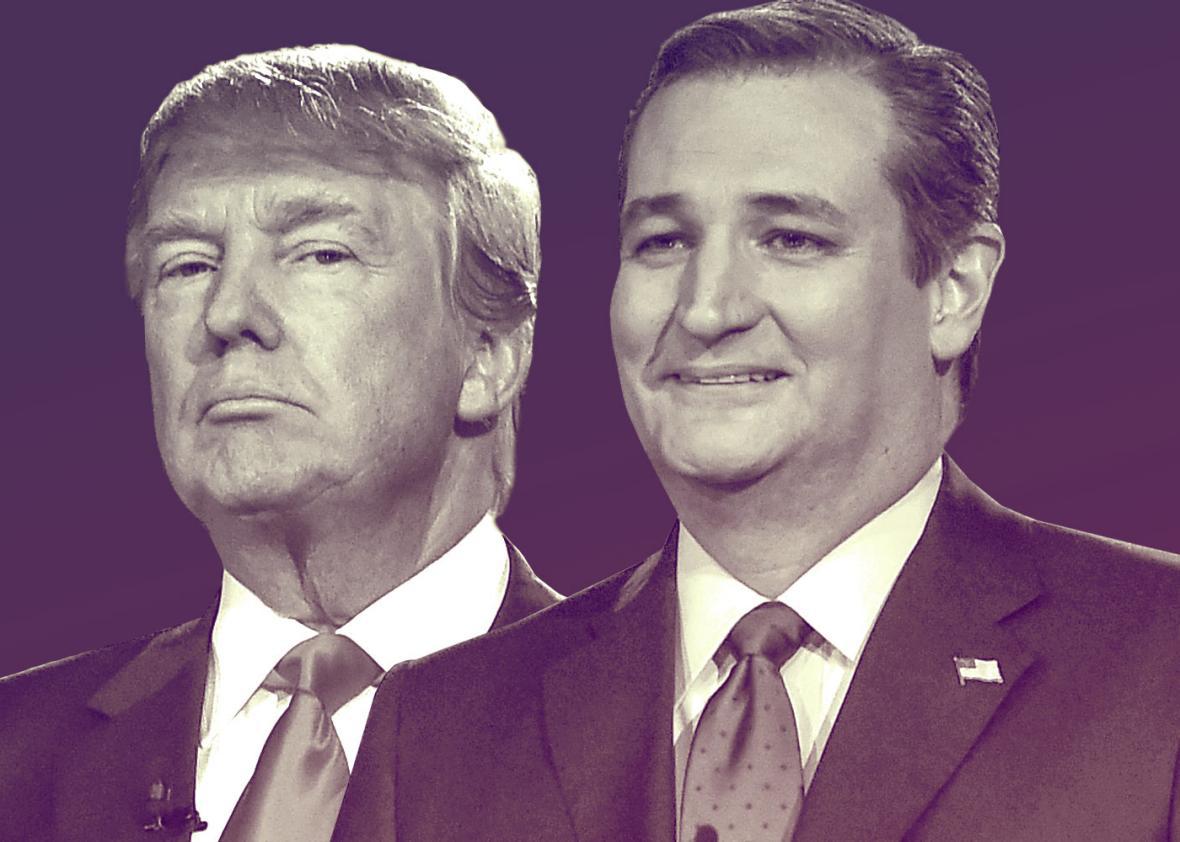Ted Cruz has an establishment résumé. Princeton, Harvard Law, a clerkship with Supreme Court Chief Justice William Rehnquist, the George W. Bush campaign and the Bush administration.* He’s a state solicitor general turned United States senator. He’s married to an executive at Goldman Sachs.
And yet, Cruz runs—and so far, wins—as an insurgent opposed to the conventional Republican establishment. “I believe I will be that conservative candidate,” says Cruz to Tim Alberta of the National Review, describing his theory of the race, where a conservative insurgent candidate eventually faces a “moderate” backed by GOP elites. “The establishment is enthusiastically unifying behind Marco Rubio,” he continues.
Cruz is a good pundit, but this isn’t right. At this stage, the Republican presidential field has two divisions: On one side there is an ascendant Donald Trump, a rising Cruz, and a declining Carson. In the Real Clear Politics average, they account for more than 64 percent of Republican primary voters. On the other side are the most viable “establishment” candidates. Sen. Marco Rubio leads with 11.5 pecent support, and he’s followed by Jeb Bush with 4.4 percent, Gov. Chris Christie with 3.9 percent, and Gov. John Kasich with 2.1 percent. You can include Carly Fiorina too, with 2.4 percent. All of them are vying for the same group of moderate conservative voters. Meanwhile, Rubio is also trying to build ties to more right-wing Republicans.
If Rubio could unify the establishment, he would shoot to the head of the pack. Not ahead of Trump, but beyond Cruz. At which point, if Trump faltered or faded, Rubio could vie for his voters without winning a majority of them.
What’s interesting is that this is almost a mirror image of the 2012 primary, where the GOP establishment’s candidate, Mitt Romney, fought and won against a bevy of factional conservative candidates. Except here, Cruz is the establishment candidate, consolidating his position against a fractured field. Except, Cruz isn’t the “establishment” in the way we tend to think of it. Instead, he’s the standard-bearer for a kind of counter-establishment, part of Washington but based outside of it, and committed to an ideological purity that escapes more mainstream Republicans.
Writing for the New York Times, David Brooks describes this counter-establishment: “[It] believes that Washington is pervasively corrupt and is implacably hostile to the G.O.P. leadership.” It is the “movement” in “movement conservatism,” and since he came to Washington, Brooks writes, Cruz has “meticulously aligned himself” with its leaders, donors, and key figures.
Indeed, in the past month, the Texas senator has won support among the most prominent and powerful evangelicals in the country. “Huddling in a hotel in suburban Washington,” writes Tom Hamburger for the Washington Post, a group of evangelical leaders “held an extended debate about whether to support Cruz or Rubio and in the end voted for the Texan.” Likewise, Cruz has all but won the talk radio primary, with positive coverage from personalities like Laura Ingraham, Rush Limbaugh, Mark Levin, and Erick Erickson. Cruz’s staggering fundraising—from grassroots contributors and major donors—is a testament to the success of his strategy.
In the same way that Romney courted and built support among traditional Republican elites and donors before reaching out to different factions as an acceptable candidate, Cruz has done the same, except from the other side. He has unified a formerly disparate counter-establishment of right-wing conservatives, shutting out potential competitors like Mike Huckabee and Bobby Jindal, and putting himself in a place to either win a match-up with an “establishment”-centered candidate, or—if those candidates falter—offer himself as the only one who could beat a true insurgency in the form of Trump.
After all, the functional difference between someone like Cruz and someone like Rubio is small. Both would sign massive tax cuts, both would appoint conservative Supreme Cout justices, both would stack cabinet posts and regulatory agencies with like-minded appointees.
With that said, Cruz doesn’t have to win to change the game. In building the first truly formidable campaign of the counter-establishment, Cruz has shown its power and influence, especially if he succeeds in actual voting. He may not become the Republican presidential nominee—although, for standing as a so-called consensus candidate, Rubio isn’t any closer—but he’s greatly raised the odds that, eventually, someone like him will.
Correction, Dec. 24, 2015: This post originally misidentified the first name of the chief justice who Ted Cruz clerked for. It was William Rehnquist, not John. (Return.)
